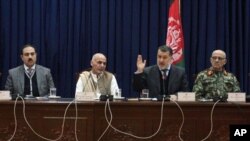ISLAMABAD —
The Afghan government has announced the fourth stage of the security transition, with Afghan forces set to take over responsibility for the security of nearly 90 percent of the country's population from NATO troops.
Ashraf Ghani Ahmadzai, head of the country's security transition commission, told reporters in Kabul Monday the process has been progressing since it began in March 2011.
He said the three earlier stages of the security transition had put Afghan security forces in charge of safeguarding 75 percent of the population, and that the fourth stage will extend Afghan security responsibility to another 52 administrative units, which includes 12 provinces mostly in the north and interior of the country.
"An additional 11 percent of the population of the country will be covered in these 52 units," said Ahmadzai. "Altogether, we will be reaching 87 percent of the population of the country."
Ahmadzai reiterated that the goal of the transition process is assumption of full security by Afghan forces in December 2014, when most NATO troops will have withdrawn.
The government, he added, is well ahead of schedule and pleased with the outcome of previous stages.
"With very small exceptions, the general assessment is that the security conditions are better or the same at the beginning of those tranches, so we go forward with confidence."
The number of Afghan forces has rapidly grown over the past year, but critics are skeptical about their ability to maintain the country's security after withdrawal of the foreign troops.
Responding to criticism, Ahmadzai said Kabul officials decidedly emphasized quantity of personnel resources over the past three years.
"Now the emphasis is on quality," he said, explaining that Afghan national security forces have reached a ceiling of 350,000 members.
Both NATO Secretary-General Anders Fogh Rasmussen and the U.S. commander of international troops in Afghanistan, General John Allen, praised Monday's announcement as a significant step toward transferring full responsibility for security from NATO to Afghan national forces. General Allen said it is expected that all parts of Afghanistan will have begun the transition by summer 2013, and that Afghan forces will be in the lead for security nationwide.
Since the security transition began, there has been an increase in the number of causalities among Afghan troops and police, who now take the lead in most of the combat operations conducted jointly with NATO troops.
While insurgent violence in Afghanistan fell in 2012 and the overall security situation has seen improvement, the number of insider attacks by Afghans in uniform against their foreign counterparts has sharply increased. Those attacks left more than 60 foreign troops dead this past year and eroded confidence between the two sides.
Ashraf Ghani Ahmadzai, head of the country's security transition commission, told reporters in Kabul Monday the process has been progressing since it began in March 2011.
He said the three earlier stages of the security transition had put Afghan security forces in charge of safeguarding 75 percent of the population, and that the fourth stage will extend Afghan security responsibility to another 52 administrative units, which includes 12 provinces mostly in the north and interior of the country.
"An additional 11 percent of the population of the country will be covered in these 52 units," said Ahmadzai. "Altogether, we will be reaching 87 percent of the population of the country."
Ahmadzai reiterated that the goal of the transition process is assumption of full security by Afghan forces in December 2014, when most NATO troops will have withdrawn.
The government, he added, is well ahead of schedule and pleased with the outcome of previous stages.
"With very small exceptions, the general assessment is that the security conditions are better or the same at the beginning of those tranches, so we go forward with confidence."
The number of Afghan forces has rapidly grown over the past year, but critics are skeptical about their ability to maintain the country's security after withdrawal of the foreign troops.
Responding to criticism, Ahmadzai said Kabul officials decidedly emphasized quantity of personnel resources over the past three years.
"Now the emphasis is on quality," he said, explaining that Afghan national security forces have reached a ceiling of 350,000 members.
Both NATO Secretary-General Anders Fogh Rasmussen and the U.S. commander of international troops in Afghanistan, General John Allen, praised Monday's announcement as a significant step toward transferring full responsibility for security from NATO to Afghan national forces. General Allen said it is expected that all parts of Afghanistan will have begun the transition by summer 2013, and that Afghan forces will be in the lead for security nationwide.
Since the security transition began, there has been an increase in the number of causalities among Afghan troops and police, who now take the lead in most of the combat operations conducted jointly with NATO troops.
While insurgent violence in Afghanistan fell in 2012 and the overall security situation has seen improvement, the number of insider attacks by Afghans in uniform against their foreign counterparts has sharply increased. Those attacks left more than 60 foreign troops dead this past year and eroded confidence between the two sides.




